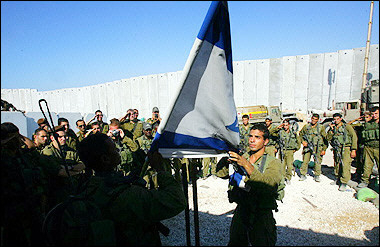|
Palestinians taking control in Gaza Strip
(AP)
Updated: 2005-09-12 09:06
The Palestinians also say the occupation is not really ending, noting that Israel will continue to control Gaza's airspace, territorial waters and border passages. "Despite Israeli claims to the contrary, the Gaza Strip will remain occupied Palestinian territory under international law," Palestinian Cabinet minister Mohammed Dahlan said.
The final phase of the pullout began Sunday with twin decisions in the Israeli Cabinet — to end military rule in Gaza and not to raze 19 synagogues in former Jewish settlements there.
The vote on the military rule was largely symbolic. Israel already has withdrawn all of its 8,500 settlers from Gaza, leaving only soldiers there.
On Sunday evening, Israel closed down its army headquarters in Neve Dekalim, and several hours later, convoys began rolling out of the strip. "Everything is coordinated, everything is based on a plan, organized. We are leaving strong," said one Israeli field commander, Lt. Col. Tzvila Tzoran.

Israeli soldiers from the Golani brigade take part in a flag-lowering ceremony as they prepare to withdraw from the Girit outpost in the southern Gaza Strip.[AFP] |
Moments before getting the final pullout order, Tzoran sat on the turret of a tank on an isolated sand dune, bidding farewell to the Gaza coastline he had come to love during his one-year stint. Other soldiers took pride in the orderly withdrawal, in contrast to the hasty retreat from Lebanon five years ago.
On the Palestinian side, dozens of Palestinians troops set up positions on a sand dune, just south of Gaza City, near Netzarim. One of the officers, Tarek Issa, waved a Palestinian flag. "I cannot wait to go and raise it inside. Today is the beginning of the victory," he said.
However, the celebrations were marred by disputes over border arrangements.
The Palestinians want full control over the Gaza-Egypt border after Israel's withdrawal, saying free movement of people and goods is essential for rebuilding Gaza's shattered economy. Israel wants to retain some control, at least temporarily, fearing that militants will smuggle weapons into Gaza.
Israel last week unilaterally closed the Rafah border crossing, the main gateway for Gaza's 1.3 million Palestinians, to the outside world.
Last week, Israel agreed in principle that foreign observers could eventually replace Israeli inspectors at Rafah. However, Israel said it could be months before the border reopens, and that a final deal would depend on Palestinian willingness to crack down on militant groups.
In the meantime, it plans to reroute border traffic through alternate Israeli-controlled crossings and turn over security control of the border to Egyptian forces, 750 of whom have deployed at the border this weekend.
|